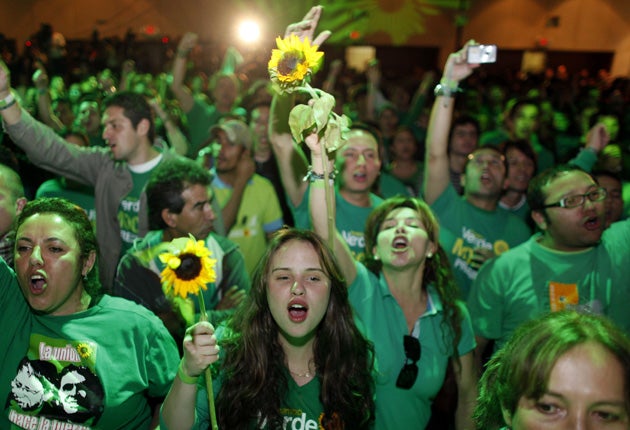Colombians go cold on green candidate at the ballot box
After a close-run presidential campaign the right-wing successor to Uribe's rule appears set for victory. Guy Adams reports

When they got to the polling booth, the people of Colombia appear to have held their noses and decided to vote for the devil they knew, handing a clear victory to Juan Manuel Santos, the chosen successor of outgoing right-wing leader Alvaro Uribe, in Sunday's presidential election.
Mr Santos won more than 47 per cent of the vote, putting him well ahead of the colourful Green Party candidate Antanas Mockus, who had been neck-and-neck with him in the field of nine but scored a mere 21 per cent. The two men will now contest a run-off election in three weeks. The result was an endorsement of Mr Uribe's tough security policies, which Mr Santos had been in charge of implementing. In recent years, they have severely limited the operations of Farc, the drug-running rebels who have been fighting for 46 years to install a Marxist government.
It also represented a vote of confidence in Mr Uribe's stewardship of the economy. Unemployment is hovering around 14 per cent, but recent years have seen huge investment in Colombia's mining and energy sectors. Mr Santos promised not to undermine that growth by raising taxes.
"Mr President Uribe, this is your triumph and that of those who want to preserve your immense legacy," Mr Santos told supporters on Sunday night. "Most Colombians voted to defend your achievements and proposals... I am excited and I receive these results with humility.
Mr Santos, 58, is an accomplished- if perhaps unexciting – career politician, and should now have little trouble securing the 50 per cent support he needs to win the run-off. Two former Uribe ministers who also ran are now expected to offer endorsements, theoretically giving him a 60-40 majority.
The only cloud on his horizon concerns the Uribe administration's human rights record. The former president was tainted by a string of corruption and political spying scandals, together with revelations that government forces carried out thousands of extrajudicial killings.
Last week, the UN released a report claiming that troops loyal to Uribe may have committed as many as 2,000 "false positive" murders in six years. The term refers to the practice of shooting civilians and dressing their corpses in combat gear to make them look like rebels.
By supporting a party linked to such abuses, Colombians appear to have decided that corruption and human rights violations represent a small amount to pay for heightened internal security.
Because Farc has been removed from major cities, Sunday's elections passed off relatively peacefully, with just four rebel attacks, and seven unsuccessful attempted bombings. Mr Santos boasts largely positive relations with Washington, so his election will also upset Colombia's left-leaning neighbours. Venezuelan President Hugo Chavez has branded him "a threat to the entire region", while a court in Ecuador has already indicted him to stand trial for green-lighting an attack on a Farc camp a mile inside its borders in March 2008. Mr Mockus would perhaps have been a more popular choice in the region. An eccentric former University pastor, he rose from obscurity to become the most credible alternative to Mr Santos on a ticket of "cleaning-up" politics.
Although his bid stole headlines, and gained him a huge following on Twitter and Facebook, Mr Mockus never quite silenced his security and foreign policy credentials.
Scandals and successes - by Enjoli Liston
*During eight years as Colombian leader, Alvaro Uribe Velez has presided over a mixed bag of successes and scandals. After 15 attempts on his life by Farc rebels before he took office in 2002, the President received much praise for his tough security measures against long-standing Marxist insurgents. Rebel numbers have halved, and with the help of close US links, drug production has also decreased. Nonetheless, Uribe and Juan Manuel Santos, the former Defence Minister tipped to succeed him, have been criticised for policies which rate the army's success by the number of enemies killed in battle. To meet targets, civilian vagrants have allegedly been murdered and presented as dead rebels. The President has also been forced to deny ordering illegal phone-tapping operations. Despite this, it seems Uribe's achievements outweigh the controversies: some 60 per cent of Colombians pledge their approval for the leader.
Join our commenting forum
Join thought-provoking conversations, follow other Independent readers and see their replies
Comments